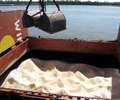

Indian traders for the first time have signed sugar export contracts five months ahead of shipments as a likely drop in Brazil’s production prompted buyers to secure supplies from the South Asian country in advance, five trade sources told Reuters.
Sugar production in Brazil, the world’s biggest producer and exporter, is likely to drop due to a drought and frost that has damaged the sugarcane crop.
Traders said the likely decline has already lifted sugar prices near their highest levels in 3-years and it is prompting buyers to secure supplies in advance from India, the world’s second biggest sugar producer.
So far, traders have contracted 500,000 tonnes of raw sugar for the shipments in December and January between $435 and $440 a tonne on a free-on-board (FOB) basis, they said.
“Mills would start production after 3-4 months, but traders have sold new season raw sugar for December-January shipments in advance,” Rahil Shaikh, managing director of MEIR Commodities India.
Four other sources who confirmed the export agreements could not be named because of their company policies.
Indian traders usually sign contracts one or two months in advance and only after the government announces the export subsidy for the overseas sales.
Indian mills, which are compelled by the government to buy sugarcane from farmers at a set minimum price, have for the last three years only been able to sell competitively to exporters with the help of subsidies.
However, surging global prices have made sugar exports without government incentives viable in recent days.
The country is set to export a record 7 million tonnes of sugar in the ongoing 2020/21 marketing year ending on Sept. 30.
Erratic weather in Brazil could create tightness in supplies during November to April in the world market, and there is a sense that buyers are focusing on procurement from India, a Mumbai-based dealer with a global trading firm said.
Brazil’s food supply and statistics agency Conab said on Wednesday that recent cold weather killed sugarcane plants in parts of the Centre-South region, exacerbating losses already caused by water stress.
Unlike Brazil, Indian mills mostly produce white sugar, but traders are encouraging them to produce raw sugar at the start of the season and contracting that quantity for export, another Mumbai-based dealer with a global trading firm said.
“Mills need funds to make cane payments at the beginning of the season. They could make raw sugar and raise funds quickly,” the dealer said.
Source: Reuters (Reporting by Rajendra Jadhav; Editing Euan Rocha and David Evans)